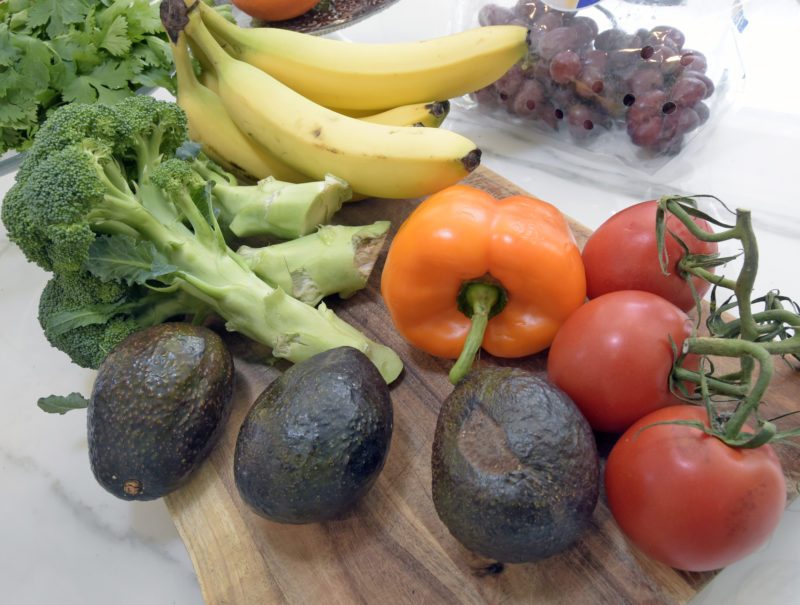With germs and viruses the center of attention in 2020, so should be your immune system, as this complicated network of immune cells stands between you and these deadly infections, helping to fight off those bacteria and viruses.
In order for your immune system to work at its best, you need to be getting the right nutrients in your diet, so here are some tips from local nutritionists that can help you keep those immune cells happy.
‘Eat the rainbow’
“We are what we eat,” Michelle Schirra, a clinical nutritionist with about 20 years of experience said in a recent interview. “Food is a huge part of who we are. … I think it’s still very new for people to realize how important food is, (but) food can be like medicine and food can heal.”
Henry Mayo Newhall Hosptial’s Clinical Nutrition Manager Maria McIntosh agreed, adding, “The best thing that we can do from a lifestyle standpoint, as far as our immune system goes, is to eat healthy food.”
Both Schirra and McIntosh agree that eating at least five fruits and vegetables a day in a variety of colors, from dark green to yellow to orange, gives your body the antioxidants it needs.
“Eat the rainbow,” McIntosh added. “So get vegetables and fruits that are green, purple, orange, etc. Try to let those be more of the focus of your meal.”
Some of the foods and spices that Schirra recommends include spinach, kale, broccoli, sprouts, cilantro, celery, all of the berries, papaya, beets, sweet potatoes, red leaf, romaine and butter lettuce, oregano, thyme, peppermint, apples, bananas, figs, dates, parsley, garlic and sage.
McIntosh also suggests people use the U.S. Department of Agriculture’s MyPlate tool, where they can go online or download the app to figure out which foods can help build healthy eating habits.
“My biggest advice is to try to eat whole foods, and stay away from snacking on packaged products and driving through and getting fast food,” Schirra added.
On the other hand, the top things Schirra always suggests people avoid are the top five allergens that can compromise your immune system, which include dairy, gluten, corn and soy, along with eggs, though Schirra says eggs can be a great source of protein.
“Eggs, especially the yolk, can cause inflammation, but on the flip side of that, it is a pure protein,” Schirra added, “so I don’t always have people avoid those unless they’ve got some kind of an autoimmune disease.”
Both Schirra and McIntosh agree that while you may not make these healthy choices 100%, continue to push yourself.
“We’re not going to be 100%, but it doesn’t have to be an all or nothing proposition,” McIntosh added. “Make the best choices as often as you can.”

Other lifestyle changes can help, too
Getting enough sleep can be crucial to your health, both McIntosh and local nutritionist Natasha Diaz noted.
“It sounds simple, but you’d be surprised how little people focus on this factor, which plays a big role in how well your body works,” Diaz said. “Your body needs rest to function properly.”
McIntosh agreed, adding, “Many Americans have a difficult time falling asleep or staying asleep at night.”
There are a few things you could be doing before bed that can be hindering your sleeping, including drinking caffeine, getting too much screen time and drinking alcohol.
“All the things that we say with young kids, like have a routine at night, do soothing things or read a story, it really applies to really all of us,” McIntosh added.
Both Diaz and McIntosh also highlighted the importance of exercise, even if that just means taking the stairs instead of the elevator.
With gyms closed, people have had to get creative to find a workout that fits their needs, but nowadays, there are plenty of online videos that can help you get a little more active.
“If you realistically can only devote 10 minutes a day to that, do it, but do it most days,” McIntosh added. “You might not feel like doing it initially, but afterward, you tend to feel better.”
Supplementing those good habits
While all three nutritionists agree that there’s a lot we can do to give our immune systems a helping hand, they all suggest speaking to your doctor before taking any supplements, as they can sometimes counteract prescription medications.
That being said, essential vitamins can help you produce enough immune cells to keep your immune system running well, while other vitamins can also kill off harmful microbes, Diaz said.
Some of the supplements Schirra recommends include vitamin D3, B12, flaxseed oil, omega-3, cod liver oil, magnesium, turmeric and curcumin, along with a multivitamin, which can help to give you a lot of the helpful vitamins you need in one dose.
In addition, a good probiotic can help to replenish your digestive system with the good bacteria it needs to keep balanced.
“In a nutshell, we have about 4 trillion microbiomes in our body, and about 800 billion of them live in our small intestines, and that’s what makes up our immune system,” Schirra said. “A lot of times when we’re not eating right, we’re drinking a lot of alcohol, it can produce a lot of bad bacteria.”
Your body is always full of bacteria, both good and bad, and probiotics are often called “good” or “helpful” bacteria because they help keep your gut healthy.
“People get all kinds of good bacteria from eating fruits and vegetables because fruits and vegetables break down and feed our good bacteria just like a probiotic would,” Schirra added. “That’s why sometimes if you have a really good whole food diet with a lot of plant-based veggies and fruits, you don’t necessarily need a probiotic.”














